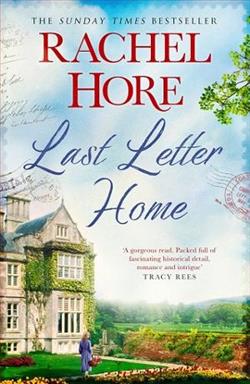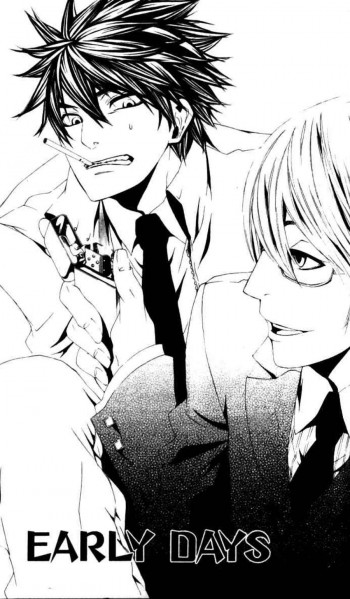
Last Letter Home
by Rachel Hore
On holiday with friends, young historian Briony Andrews becomes fascinated with a wartime story of a ruined villa in the hills behind Naples. There is a family connection: her grandfather had been a British soldier during the Italian campaign of 1943 in that very area. Handed a bundle of letters that were found after the war, Briony sets off to trace the fate of their sender, Sarah Bailey.
In 1939, Sarah returns with her mother and sister from India, in mourning, to take up residence in the Norfolk village of Westbury. There she forms a firm friendship with Paul Hartmann, a young German who has found sanctuary in the local manor house, Westbury Hall. With the outbreak of war, conflicts of loyalty in Westbury deepen.
When, 70 years later, Briony begins to uncover Sarah and Paul’s story, she encounters resentments and secrets still tightly guarded. What happened long ago in the villa in the shadow of Vesuvius, she suspects, still has the power to give terrible pain …
.
Read
Last Letter Home on http://kissnovel.net
Martial Peak Reviews
Rachel Hore's Last Letter Home is a captivating exploration of history, memory, and the enduring impact of war on personal lives. Set against the picturesque yet tumultuous backdrop of Italy during World War II, the novel weaves a dual narrative that seamlessly connects the past and present, offering readers a rich tapestry of love, loss, and the relentless quest for truth.
The story begins with Briony Andrews, a young historian on holiday in Italy, who becomes intrigued by the ruins of a villa near Naples. This villa, steeped in history, holds a personal connection for Briony, as her grandfather served in the region during the Italian campaign of 1943. Her curiosity is piqued further when she receives a bundle of letters from the wartime era, penned by a woman named Sarah Bailey. These letters serve as a gateway into a past filled with intrigue and unresolved mysteries.
Hore masterfully crafts the character of Briony, whose academic curiosity and personal ties to the story drive the narrative forward. Her journey is not just one of historical discovery but also of personal growth, as she navigates the complexities of family legacy and the shadows of the past. Briony's character is relatable and compelling, embodying the universal desire to understand where we come from and how it shapes who we are.
Parallel to Briony's modern-day quest is the historical narrative of Sarah Bailey, a young woman who returns to England from India in 1939. Sarah's story is one of adaptation and resilience, as she and her family settle in the Norfolk village of Westbury. Here, she forms a deep bond with Paul Hartmann, a German refugee residing at Westbury Hall. Their friendship, set against the backdrop of impending war, is fraught with tension and conflicting loyalties, capturing the essence of a world on the brink of chaos.
Hore's portrayal of Sarah is both nuanced and empathetic. Sarah is a character caught between worlds, navigating the expectations of her family and society while grappling with her own desires and moral dilemmas. Her relationship with Paul is tender yet complicated, reflecting the broader conflicts of the era. Through Sarah, Hore explores themes of love and loyalty, and the difficult choices that war imposes on individuals.
One of the novel's strengths lies in its exploration of the impact of war on personal relationships and communities. The village of Westbury becomes a microcosm of the larger world, where alliances are tested and secrets are buried. Hore skillfully depicts the tensions and suspicions that arise in a community divided by war, highlighting the human cost of conflict.
The dual narrative structure of Last Letter Home is executed with precision, allowing the past and present to inform and enrich each other. As Briony delves deeper into Sarah and Paul's story, she uncovers long-held resentments and secrets that continue to reverberate through the generations. Hore's ability to intertwine these narratives creates a sense of continuity and connection, underscoring the idea that history is not just a series of events but a living, breathing entity that shapes our present.
Hore's writing is evocative and atmospheric, bringing to life the landscapes of both wartime Italy and rural England. Her attention to detail and historical accuracy lend authenticity to the narrative, immersing readers in the time periods she depicts. The villa in the shadow of Vesuvius becomes a symbol of both beauty and tragedy, a place where love and loss are inextricably linked.
In comparison to other historical novels, such as Kate Morton's The Forgotten Garden or Kristin Hannah's The Nightingale, Last Letter Home stands out for its intricate character development and the seamless integration of historical and contemporary narratives. Hore's ability to create complex, believable characters who resonate with readers is a testament to her skill as a storyteller.
Overall, Last Letter Home is a poignant and thought-provoking novel that explores the enduring impact of history on personal lives. Through the intertwined stories of Briony and Sarah, Hore delves into themes of love, loyalty, and the search for truth, offering readers a compelling and emotionally resonant journey. This novel is a must-read for fans of historical fiction and anyone interested in the intricate connections between past and present.
Rachel Hore has crafted a narrative that is both timeless and timely, reminding us of the power of history to shape our identities and the importance of uncovering the stories that define us. Last Letter Home is a testament to the resilience of the human spirit and the enduring quest for understanding and connection.
























Reviews 0
Post a Reviews: